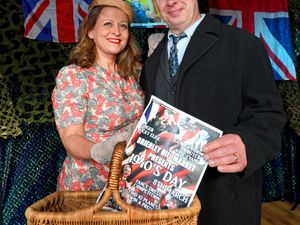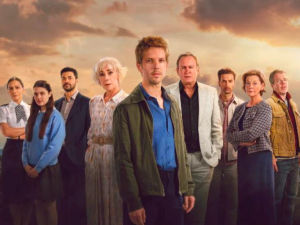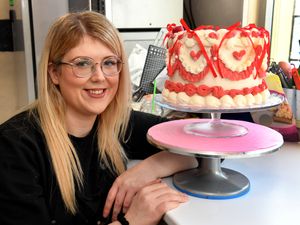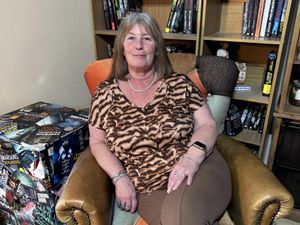Peter Hook: Filling Ian Curtis’s shoes was tough
He’s the man with a million tales. Hooky, of Joy Division and New Order, shares them with us
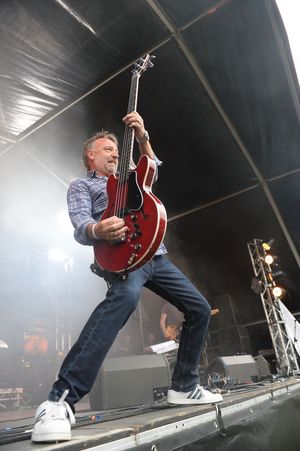
He’s one of the most important rock stars of the past 40 years. Peter Hook – he of Joy Division, New Order, the Hacienda and the lowest-slung bass in Christendom – is also one of the most interesting. Charismatic, self-deprecating, honest (sometimes too much so) and formidably well-connected, he has stories to make jaws drop.
He lost £13 million – yes, £13 million – on the Hacienda; he and his old bandmate, Bernard Sumner, are locked in rock’s most bitter feud since Noel Gallagher stormed out of Oasis; and he talks with great eloquence about the late, great and tragic Ian Curtis.
Hooky is the go-to man for the lowdown on the reasons why the Stone Roses split (again), having at one time produced them and become mates, while he escaped near tragedy twice this year when terrorists struck in Manchester and Barcelona. His second wife was the late and hilarious-but-troubled Caroline Aherne, while back in the late 1970s he was questioned by policed as a suspect in the Yorkshire Ripper case because his tours matched Peter Sutcliffe’s movements. And we’re supposed to fit that little lot into 2,000 words? Wish us luck.
It starts in the worst possible fashion. An earlier interview over-runs making us 15 minutes late for our allotted 12noon interview. The rules of engagement usually mean the interview is therefore off – rock stars get the hump and imagine lateness is a slight, a snub and a measure of disrespect – but Hooky laughs it off.
“Who was it?” he says, laughing. And then we talk and talk and talk, running past the cut-off time by 30 minutes. Generous and engaging throughout, he’d still be going if we’d stayed on the line.
He’s been on the road for some time with his Substance tour, which features the music of Joy Division and New Order. As well as playing those era-defining bass lines – Peter always made the bass sing like a guitar, rather than simply keep the rhythm – he’s also stepped up to the mic as lead singer. The tour will reach Wolverhampton’s Slade Rooms on December 14 and fans are in for a treat. From LA to Manchester, the reviews have been electric with critics purring about shows that run for up to two-and-a-half hours and feature the greatest hits of both New Order and Joy Division.
The shows are based around the bands’ singles compilations, Substance, which sold millions of copies around the world. And though fans might imagine the record came about because the bands wanted to cash-in, they’d be entirely wrong.
“Substance came about by default,” he says. “Tony Wilson, who ran our label, Factory, had bought a new Jag. It had a CD in it, which was new technology back then, but Tony had nothing to play in it because there still weren’t many CDs – everything was vinyl and tape.
“So he suggested to us that we do a New Order singles CD, so he’d have something to play. We weren’t that bothered. We didn’t see anything wrong in the idea so we went along with it.”
The rest is history. “Substance became our biggest selling record. In America alone it sold two million copies.”
The record was such a hit that Tony decided to release a Joy Division version, featuring the band from whose ashes New Order rose. It was a completely different animal. “A lot of the tracks we’d done were a lot more cult-ish. They weren’t promoted as singles. They were given away tracks to the vinyl magazines and free magazines in Germany.”
Hooky continues to make a living playing the songs of New Order and Joy Division. And why wouldn’t he? He co-founded both bands and was involved in the creation of a battalion of songs that have stood the test of time.
Joy Division featured singer Ian Curtis, keyboardist Bernard Sumner, drummer Stephen Morris and Hook on bass. They formed after Bernard and Peter attended a Sex Pistols gig and were inspired to create their own band. They changed their name – and their line-up – following the suicide of Ian Curtis in 1980. Hooky played in the new band until 2007, when his relationship with Bernard disintegrated. In the intervening decade, things have only got worse.
“I’m in an odd position, especially with the ongoing New Order legal battle. Playing those songs is a bittersweet thing. It reminds me of the good times and the wonderful things we created. It reminds you of the fight and the past in a good way. Substance is a great LP to play – by both bands. I like playing Shellshocked. Most of the tracks on Substance haven’t been played for 25 years. So I’m on this massive journey of playing every song I’ve ever written and recorded.”
The two LPs – he calls them that, rather than albums or CDs – are very different. Joy Division’s is much darker but people still relate. “We’ve had a great time and have gone all around the world. And we’ve extended the tour this year. We’re going to Australia and back to America, where we’ve done really, really well.”
Fronting a band has been a remarkable experience for Hooky. Throughout his career, he’s been the brooding presence, scowling from the sidelines as he’s kept the beat. Now, he’s up front and in charge. All eyes are on him. And while he’s had no trouble following in the footsteps of Bernard – quelle surprise – he’s found tackling the role of Ian Curtis a trickier proposition.
“It took me a long time to settle into doing it because I was very frightened by Ian Curtis. His shoes were very big shoes to fill. Luckily for me, Barney’s were a bit more of a snug fit. The fact we wrote the vocal lines and the lyrics together in New Order took away the unfamiliarity. I listened to Ian all the time and loved what he did but I was unfamiliar with singing those songs because Ian used to do it all on his own. Barney was a lot easier. We did the New Order stuff together: me, him and Steve wrote all the words and melodies right up until Technique.”
Ian remains an iconic figure in the history of alternative British music. Thirty-seven years after his death, the depressive epileptic remains a unique aura. Swaddled in mystery and intrigue, his lyrics were filled with images of alienation and emptiness. Hooky knew him as well as anyone and remains tender, affectionate and empathetic.
“Ian very much had a Jim Morrison feel to him. The weird thing is that, oddly, when I started doing the Joy Division songs, everybody accused me of cashing in. But the fact I waited 35 years to play these songs seemed lost on those people. There was a contradiction in the very idea I’d want to cash in. For me, I wanted to celebrate Ian’s life. I celebrated 35 years of Joy Division by playing every track in one go in the church that Ian used to go to. It was a charity gig.
“The thing for me is that it’s amazing how many youngsters the music resonates with. In 2017, I’m still getting asked by kids what he was like. And the answer is that he was a really nice guy. He was one of the most generous lead singers. Usually that word – generous – doesn’t fit in the same sentence as the word lead singer, both financially and otherwise. They’re always careful, shall we say, if we’re being nice. But Ian was happy for us to sing and would encourage us to sing too.
“What you have to explain is how ill he was and the treatment he received for epilepsy in those days wasn’t far removed from the old ducking stool. The guy really suffered. For a 23-year-old man to have a new baby, a Belgian mistresss, a pop group on the way up and a failing marriage and be saddled with an illness that was serious . . . look, there’s not many people that could survive that storm in their lives.”
Hooky is wary of the glamorisation of suicide. He doesn’t want people to follow the cult of Ian Curtis, nor fall into the trap of imagining his end was somehow ‘cool’. It wasn’t.
“I hope that people realise it wasn’t a good thing he did. One of my greatest regrets is Ian didn’t get to see our success. He would have been in New Order. But he didn’t have a proper relationship with his mistress, who he was deeply in love with. His suicide took all that away. His death left me with an awful sense of guilt because I wasn’t much use at 23. The ramifications are what you hope people will look at and realise it’s something not to do. No matter how bad things get – go and get treatment, carry on and tell someone.”
We move on. Hooky’s impact has been phenomenal. He’s been part of the biggest musical movements in the post-punk era – an ever-present who’s been there, seen it and proudly wears the T-shirt.
“I’ve been very lucky mate. We did have a unique sense of being in the right place at the right time. If you look at all of us, we were involved in the three greatest waves in musical history. We opened the Hacienda and were at the forefront of acid house and Madchester.
“Acid house changed the world and changed the world of commercial Manchester. Then you look at how big Madchester was and you have to say we were very lucky. I think Ian Curtis up there must still like us for that to have happened.”
His history follows him around. A week before our interview, he was in Majorca and bumped into the guy who sold him and others the leases to the Hacienda. “He made us sign it for 25 years. That was the most ridiculous business decision since Jack and the Beanstalk. He cost us £13 million. That’s how much we lost. But it was good to see him again. And it got me a round of drinks out of it while I was on holiday.” He laughs at the absurdity of his life.
Though his forthcoming tour will celebrate the music of Joy Division and New Order, he wishes things hadn’t turned out so ugly. He’s suing them and they’re suing him. And while we’ll gloss over the details and some of Hooky’s more acidic barbs – it’s not our fight – he’s saddened by it.
“It’s very puzzling. Sometimes I get really puzzled. It’s a terrible waste of time and money. You’ve got Kim Jong Un who’s about to press the button and we’ll all be gone – yet we’re arguing like this. I’m certainly not proud of this moment in our career. Believe you me, if somebody would come and sit down – whether that was the Lord God Almighty or Beelzebub – I would shake them by the hands and get on with our lives. But we seem to be unable to extricate ourselves sadly. You have to fight for what you believe in. I’m from Salford, so’s Barney. And in Salford, the motto is: ‘Never give up’.”
For now, therefore, Substance is keeping him going. He’s having great fun ignoring his struggles and getting back to doing what he does best – playing live. Like some caged beast prowling the stage, Hooky gives form and shape one of the finest catalogues of the past three decades. When the tour is done, he’ll be back in the studio. “I’ve not done a record since his 2010 supergroup release with Freebass, which also featured Mani, from The Stone Roses and Primal Scream, Andy Rourke, from The Smiths, and singer Gary Briggs, of Haven.
“I’m feeling very guilty and I want to do another Monaco album with David Potts. But it’s a weird position to be in because I enjoy playing the old stuff. The fact New Order didn’t play it for so many years makes it all feel as though it’s still new.” It sounds it, too.
Andy Richardson


